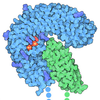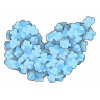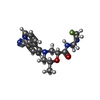+ Open data
Open data
- Basic information
Basic information
| Entry | Database: PDB / ID: 7ytp | |||||||||||||||||||||||||||||||||||||||||||||||||||||||||||||||
|---|---|---|---|---|---|---|---|---|---|---|---|---|---|---|---|---|---|---|---|---|---|---|---|---|---|---|---|---|---|---|---|---|---|---|---|---|---|---|---|---|---|---|---|---|---|---|---|---|---|---|---|---|---|---|---|---|---|---|---|---|---|---|---|---|
| Title | TLR7 in complex with an inhibitor | |||||||||||||||||||||||||||||||||||||||||||||||||||||||||||||||
 Components Components | Toll-like receptor 7 | |||||||||||||||||||||||||||||||||||||||||||||||||||||||||||||||
 Keywords Keywords | IMMUNE SYSTEM / TLR7 / antagonist | |||||||||||||||||||||||||||||||||||||||||||||||||||||||||||||||
| Function / homology |  Function and homology information Function and homology informationtoll-like receptor 7 signaling pathway / toll-like receptor 8 signaling pathway / response to cGMP / siRNA binding / early phagosome / endolysosome membrane / positive regulation of macrophage cytokine production / toll-like receptor signaling pathway / pattern recognition receptor activity / positive regulation of interferon-alpha production ...toll-like receptor 7 signaling pathway / toll-like receptor 8 signaling pathway / response to cGMP / siRNA binding / early phagosome / endolysosome membrane / positive regulation of macrophage cytokine production / toll-like receptor signaling pathway / pattern recognition receptor activity / positive regulation of interferon-alpha production / canonical NF-kappaB signal transduction / positive regulation of chemokine production / JNK cascade / positive regulation of interferon-beta production / positive regulation of interleukin-8 production / cellular response to mechanical stimulus / cellular response to virus / positive regulation of interleukin-6 production / positive regulation of type II interferon production / positive regulation of inflammatory response / double-stranded RNA binding / defense response to virus / positive regulation of canonical NF-kappaB signal transduction / receptor complex / single-stranded RNA binding / inflammatory response / innate immune response / endoplasmic reticulum / positive regulation of transcription by RNA polymerase II / metal ion binding / plasma membrane Similarity search - Function | |||||||||||||||||||||||||||||||||||||||||||||||||||||||||||||||
| Biological species |  | |||||||||||||||||||||||||||||||||||||||||||||||||||||||||||||||
| Method | ELECTRON MICROSCOPY / single particle reconstruction / cryo EM / Resolution: 2.77 Å | |||||||||||||||||||||||||||||||||||||||||||||||||||||||||||||||
 Authors Authors | Zhang, Z. / Ohto, U. / Shimizu, T. | |||||||||||||||||||||||||||||||||||||||||||||||||||||||||||||||
| Funding support | 1items
| |||||||||||||||||||||||||||||||||||||||||||||||||||||||||||||||
 Citation Citation |  Journal: Eur J Pharmacol / Year: 2023 Journal: Eur J Pharmacol / Year: 2023Title: A novel Toll-like receptor 7/8-specific antagonist E6742 ameliorates clinically relevant disease parameters in murine models of lupus. Authors: Sally T Ishizaka / Lynn Hawkins / Qian Chen / Fumitoshi Tago / Takuya Yagi / Kentaro Sakaniwa / Zhikuan Zhang / Toshiyuki Shimizu / Manabu Shirato /   Abstract: The sensing of self RNA by the endosomal Toll-like receptors (TLRs) 7 and 8 initiates pathogenic mechanisms underlying the autoimmune disease lupus. A blockade of the TLR7/8 signals may, therefore, ...The sensing of self RNA by the endosomal Toll-like receptors (TLRs) 7 and 8 initiates pathogenic mechanisms underlying the autoimmune disease lupus. A blockade of the TLR7/8 signals may, therefore, be a novel therapeutic intervention for lupus. To test the hypothesis, a novel compound E6742 that blocks TLR7/8 activation was identified. The mode of action of E6742 was investigated by analysis of the tertiary structure of TLR7 and 8 in complex with E6742. The in vitro activities of the compound were examined in cellular systems and its therapeutic potential was evaluated in murine lupus models. Tertiary structures of the extracellular domain of TLR7 and 8 in complex with E6742 showed that E6742 binds specifically and non-covalently to the hydrophobic pocket located at the interface of TLR7 or TLR8 homodimers. E6742 potently and selectively inhibited several TLR7/8-mediated cytokine responses in human PBMC. In two mouse models of lupus, oral dosing of E6742 after the onset of disease suppressed increase in autoantibodies and blocked the advance of organ damage. Collectively, the data show that TLR7/8 activation contributes to disease progression and its blocking by E6742 has potential as a therapeutic intervention for lupus. | |||||||||||||||||||||||||||||||||||||||||||||||||||||||||||||||
| History |
|
- Structure visualization
Structure visualization
| Structure viewer | Molecule:  Molmil Molmil Jmol/JSmol Jmol/JSmol |
|---|
- Downloads & links
Downloads & links
- Download
Download
| PDBx/mmCIF format |  7ytp.cif.gz 7ytp.cif.gz | 287 KB | Display |  PDBx/mmCIF format PDBx/mmCIF format |
|---|---|---|---|---|
| PDB format |  pdb7ytp.ent.gz pdb7ytp.ent.gz | 223.7 KB | Display |  PDB format PDB format |
| PDBx/mmJSON format |  7ytp.json.gz 7ytp.json.gz | Tree view |  PDBx/mmJSON format PDBx/mmJSON format | |
| Others |  Other downloads Other downloads |
-Validation report
| Summary document |  7ytp_validation.pdf.gz 7ytp_validation.pdf.gz | 1.7 MB | Display |  wwPDB validaton report wwPDB validaton report |
|---|---|---|---|---|
| Full document |  7ytp_full_validation.pdf.gz 7ytp_full_validation.pdf.gz | 1.7 MB | Display | |
| Data in XML |  7ytp_validation.xml.gz 7ytp_validation.xml.gz | 49.9 KB | Display | |
| Data in CIF |  7ytp_validation.cif.gz 7ytp_validation.cif.gz | 75.9 KB | Display | |
| Arichive directory |  https://data.pdbj.org/pub/pdb/validation_reports/yt/7ytp https://data.pdbj.org/pub/pdb/validation_reports/yt/7ytp ftp://data.pdbj.org/pub/pdb/validation_reports/yt/7ytp ftp://data.pdbj.org/pub/pdb/validation_reports/yt/7ytp | HTTPS FTP |
-Related structure data
| Related structure data |  34091MC 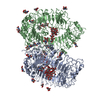 7ytxC M: map data used to model this data C: citing same article ( |
|---|---|
| Similar structure data | Similarity search - Function & homology  F&H Search F&H Search |
- Links
Links
- Assembly
Assembly
| Deposited unit | 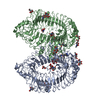
|
|---|---|
| 1 |
|
- Components
Components
| #1: Protein | Mass: 111561.273 Da / Num. of mol.: 2 / Fragment: extracellular domain,extracellular domain Mutation: N145Q/N367Q/S418L/E419V/V420P/G421R/F422G/C423S/N466Q/N777Q Source method: isolated from a genetically manipulated source Source: (gene. exp.)   #2: Polysaccharide | 2-acetamido-2-deoxy-beta-D-glucopyranose-(1-4)-2-acetamido-2-deoxy-beta-D-glucopyranose Source method: isolated from a genetically manipulated source #3: Sugar | ChemComp-NAG / #4: Chemical | Has ligand of interest | Y | Has protein modification | Y | |
|---|
-Experimental details
-Experiment
| Experiment | Method: ELECTRON MICROSCOPY |
|---|---|
| EM experiment | Aggregation state: PARTICLE / 3D reconstruction method: single particle reconstruction |
- Sample preparation
Sample preparation
| Component | Name: TLR7 in complex with an inhibitor / Type: COMPLEX / Entity ID: #1 / Source: RECOMBINANT |
|---|---|
| Molecular weight | Value: 0.2 MDa / Experimental value: NO |
| Source (natural) | Organism:  |
| Source (recombinant) | Organism:  |
| Buffer solution | pH: 4.8 |
| Specimen | Conc.: 0.8 mg/ml / Embedding applied: NO / Shadowing applied: NO / Staining applied: NO / Vitrification applied: YES |
| Vitrification | Cryogen name: ETHANE |
- Electron microscopy imaging
Electron microscopy imaging
| Experimental equipment |  Model: Titan Krios / Image courtesy: FEI Company |
|---|---|
| Microscopy | Model: TFS KRIOS |
| Electron gun | Electron source:  FIELD EMISSION GUN / Accelerating voltage: 300 kV / Illumination mode: OTHER FIELD EMISSION GUN / Accelerating voltage: 300 kV / Illumination mode: OTHER |
| Electron lens | Mode: BRIGHT FIELD / Nominal defocus max: 2200 nm / Nominal defocus min: 1000 nm |
| Image recording | Electron dose: 61.1 e/Å2 / Detector mode: COUNTING / Film or detector model: GATAN K3 BIOQUANTUM (6k x 4k) |
- Processing
Processing
| Software | Name: PHENIX / Version: 1.19.2_4158: / Classification: refinement | ||||||||||||||||||||||||
|---|---|---|---|---|---|---|---|---|---|---|---|---|---|---|---|---|---|---|---|---|---|---|---|---|---|
| EM software |
| ||||||||||||||||||||||||
| CTF correction | Type: NONE | ||||||||||||||||||||||||
| 3D reconstruction | Resolution: 2.77 Å / Resolution method: FSC 0.143 CUT-OFF / Num. of particles: 91789 / Symmetry type: POINT | ||||||||||||||||||||||||
| Refine LS restraints |
|
 Movie
Movie Controller
Controller



 PDBj
PDBj
